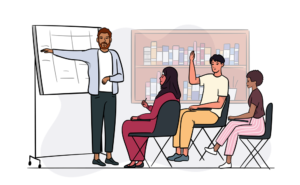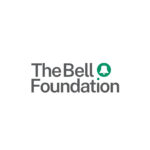In Conversation | Introducing GYROS
We spoke to Lauren Bouttell from GYROS (Great Yarmouth Refugee Outreach & Support), the latest partner of The Bell Foundation, to learn more about their organisation and their grant-funded project.
Hi Lauren, could you briefly introduce us to GYROS and what your organisation is passionate about?
GYROS is a charity that supports migrants and culturally and linguistically diverse communities in Great Yarmouth and the East of England. As well as providing information, advice, and advocacy on a range of topics for individuals, we offer community learning opportunities including ESOL. We are also active in undertaking research which brings to light migrants’ experiences in UK communities. We believe in championing the rights of migrants, refugees, and asylum seekers in the UK, and working for change locally and nationally.

Can you introduce yourself and your role in the grant-funded project?
I’m Lauren Bouttell, I organise community projects in ESOL and research at GYROS. I recently completed my PhD at the University of East Anglia, exploring learning in community organisations supporting refugees and asylum seekers. I am also an English language teacher, and have taught in Vietnam, Singapore and the UK. I love undertaking educational research and I’m interested in informal learning, adult community education, migration, and social change. I am helping to manage this Bell Foundation funded project, overseeing the design of a work-place ESOL programme with employees and employers in East Anglia, working with ESOL teachers during the rollout of the programme and continuing impact, evaluation, and monitoring throughout the project.
And what is the primary focus of your grant-funded project?
GYROS works in rural locations in the East of England where there are many food processing factories and farms in isolated areas which employ low-paid (and often underemployed) migrant workers. Because of the rurality of the locations, and the nature of the work, these workers find it difficult to access formal opportunities to learn English and feel integrated in the areas they live in. GYROS encounters many people who have lived and worked in the UK for a number of years who struggle to access services or communicate with those they need to because they have not been able to access English language education that worked for them.
This project aims to work with local employers and employees to form a programme of ESOL that will build on the rich knowledge and skills that these workers already possess. Using a flexible approach and considering the nuances of different employers and the demographics that work for them, this project will provide insights into what learning is already occurring informally in low-paid work environments, how ESOL can be delivered in such spaces, as well as providing evidence of the benefits of providing ESOL education in the workplace for employers, local communities, and society.
What specific changes do you want to see through the project?
At GYROS we are aware that our frontline delivery services that support individual migrants, refugees, and asylum seekers are fruitless if we do not also challenge the systems and policies that create the inequalities that we support people with. As such we wish to undertake research and build collaborations that have an impact in leading to social change.
Migrants in the UK have the right to learn English, and this project will improve the access of many of those living in isolated communities to English language education, and by building this model, we hope that this will have an ongoing impact in these communities. In addition, we want to evidence the importance of ESOL for employers and wider society, and we hope that the model we build will provide a basis for employers in other UK locations. This project will also highlight the challenges that migrants in rural communities face in accessing ESOL, and it will provide evidence that will support policy change, such as the importance of a national ESOL strategy for England.
What has been your experience of working with us so far and what are your aspirations for the partnership?
The experience of working with The Bell Foundation so far has been brilliant, and we feel extremely supported and have been warmly welcomed as a newly funded project. We are excited to see what the future brings!
About this partner

We believe in championing the rights of migrants, refugees, and asylum seekers in the UK, and working for change locally and nationally.
